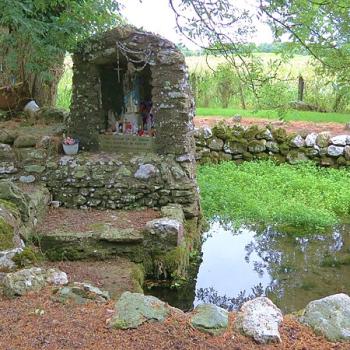
On Day 7 of the creation week, God rested from his work. Then, he blessed that day and made it holy, yet his rest was interrupted by man’s sin. So, God went back to work again to redeem his elect. He called idolatrous Abram to become the father of his chosen nation, Israel (Genesis 12:1–3). For he would be their God and they would be his people (Exodus 6:7). The Lord then sealed his promise with a covenant atop Mount Sinai. In essence, saying, “Obey my commandments and I will bless you. Disobey them and I will curse you” (see Deuteronomy 28). And this law, given through Moses, included the command,
Remember the Sabbath day, to keep it holy. Six days you shall labor, and do all your work, but the seventh day is a Sabbath to the LORD your God. On it you shall not do any work, you, or your son, or your daughter, your male servant, or your female servant, or your livestock, or the sojourner who is within your gates. For in six days the LORD made heaven and earth, the sea, and all that is in them, and rested on the seventh day. Therefore the LORD blessed the Sabbath day and made it holy (Exodus 20:8–11).
Yahweh grounded his command to observe the Sabbath in the creation account—to rest one day of seven. For in the beginning, God ordained the Sabbath rest before there ever was a need. He built this day of rest into the pattern of creation in preparation for the fall. Thus, Moses explained, “Six days you shall do your work, but on the seventh day you shall rest; that your ox and your donkey may have rest, and the son of your servant woman, and the alien, may be refreshed” (23:12).
Application Insight: We will exhaust ourselves if we work seven days a week without rest, for we were not created like machines. Instead, we are weak and fragile human beings who require frequent rest for worship and renewal. We will brake if we don’t take breaks. So, we must accept God’s instructions for our good and obey his commandments to give him glory.
God’s Sabbath laws reminded his people every week of the paradise that might have been as it pointed back to the creation. For on the Sabbath, God’s people remained within their dwelling places (16:29) just as Adam did not leave the garden. The Israelites neither kindled fires nor cooked on the Sabbath day (v. 23; 35:3), just as Adam did not need a fire for warmth or food (Genesis 2:16). The Israelites also did not buy or sell on the day of rest (Nehemiah 10:31), just like Adam who had every good thing provided for him. The Sabbath was not a day for toiling at labor or carrying heavy burdens (Exodus 20:10; Jeremiah 17:27), reminding the people that Adam was never burdened nor did he toil in the garden (Genesis 3:17–19). Most importantly, on the Sabbath, Israel delighted in their worship of Yahweh (Isaiah 58:13–14). So also, prior to the fall, Adam’s entire existence was dedicated to perfect delight in his blessed Creator. Thus, the Sabbath laws recalled the paradise of Eden and pointed forward to the paradise of heaven.
Application Insight: God built in the Sabbath day before there ever was a need for rest, for he gives his children every good gift in anticipation of their needs. How does the Lord fill you with strength even before you face life’s trials? Examine whether your own life displays a healthy pattern of work and rest as God designed.
At Sinai, God established the Sabbath day as the sign of his holy covenant: “And the LORD said to Moses, ‘You are to speak to the people of Israel and say, “Above all you shall keep my Sabbaths, for this is a sign between me and you throughout your generations, that you may know that I, the LORD, sanctify you” (Exodus 31:12–13). Yahweh then set apart his people from all the nations by reiterating his command, “You shall keep the Sabbath, because it is holy for you” (v. 14a). Yet he also warned that “everyone who profanes it shall be put to death. Whoever does any work on it, that soul shall be cut off from among his people” (v. 14b). God cared so much about establishing rest that an ancient Israelite might be stoned to death for working on the Sabbath.
Six days shall work be done, but the seventh day is a Sabbath of solemn rest, holy to the LORD. Whoever does any work on the Sabbath day shall be put to death. Therefore the people of Israel shall keep the Sabbath, observing the Sabbath throughout their generations, as a covenant forever. It is a sign forever between me and the people of Israel that in six days the LORD made heaven and earth, and on the seventh day he rested and was refreshed (vv. 15–17).
According to Jewish theologian Abraham Heschel, “[The Sabbath] is a day on which we are called upon to show what is eternal in time, to turn from the world of creation to the creation of the world.” The Sabbath implicitly instructed God’s people, Israel, that there was more to life than work. It afforded them quiet time to meditate on God’s Word and to prayerfully contemplate his timeless truths. The Sabbath was a day to worship the Creator and Redeemer who had rescued them from Egypt. For over 400 years, God’s people had been enslaved, cruelly overworked, forced to make bricks without straw and to watch their babies murdered. Since every day seemed just like the next, they had not been able to enjoy God’s Sabbath rest in Egypt. But then, by miraculous wonders and signs, Yahweh delivered his people from captivity and made a covenant with them at Sinai.
The Sabbath, therefore, was a celebration of God’s covenant. As Moses wrote, “Observe the Sabbath day, to keep it holy, as the LORD your God commanded you” (Deuteronomy 5:12). Moses emphasized Israel’s redemption out of Egypt: “You shall remember that you were a slave in the land of Egypt, and the LORD your God brought you out from there with a mighty hand and an outstretched arm. Therefore the LORD your God commanded you to keep the Sabbath day” (v. 15). Thus, Deuteronomy’s restatement of God’s command gave added meaning to Israel as they entered the promised land. For the Sabbath day and its ritual observance would be the sign of God’s covenant with his chosen people. No other nation observed the Sabbath. None but Israel had received this blessed law. And what a means of grace! The Sabbath called them to reflect on eternal things, including God’s initial rest when he first made the world. As they gazed into heavens, they observed their Creator’s “invisible attributes, namely, his eternal power and divine nature” (Romans 1:20). As they sang their Savior’s worship, they remembered the choruses of Moses and of Miriam with the Red Sea foaming and unfurling in the background (Exodus 15; Psalm 92). As they offered sacrifices and kept the commandments, they delighted in their Redeemer who had rescued them from slavery (Numbers 28:9–10; Psalm 119:24). They would uniquely worship on the Sabbath until the cross declared God’s Sabbath rest to be meant for more than Israel.
Application Insight: In the old covenant, how did Israel model God’s rest on the Sabbath? How do Christians today model God’s rest on Sundays? What principles remain the same and what has been reshaped by the new covenant?
6/28/2023 4:29:46 AM





